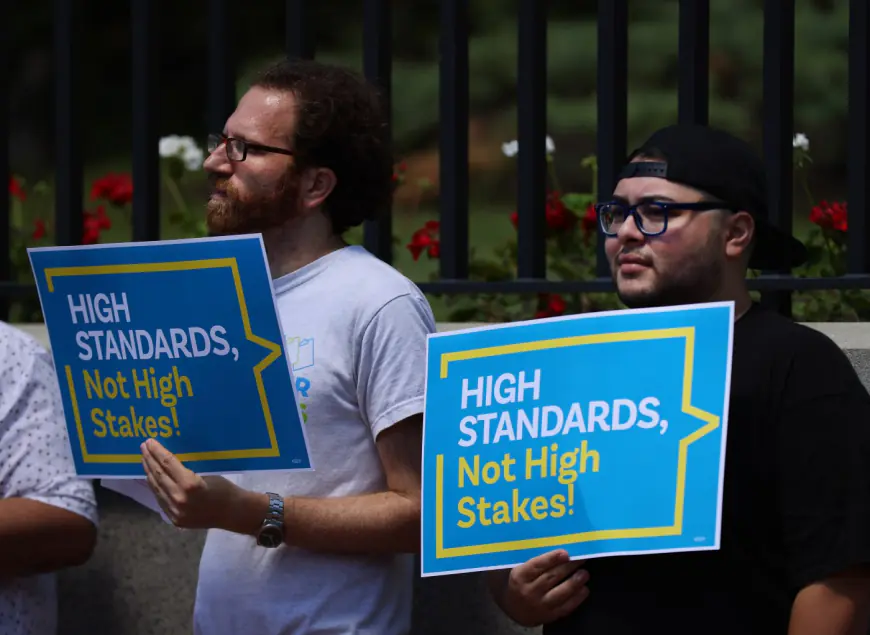In the dark: As MCAS question goes to voters, ‘no formal communication’ from DESE
If voters elect to overturn the MCAS graduation requirement, Boston Public Schools will look to state guidance and develop a plan in "robust conversations," a district leader told the School Committee.

If voters opt to overturn the MCAS graduation requirement, Boston Public Schools will look to state guidance and develop a plan in “robust conversations,” a district leader told the School Committee.
“We don’t have any formal communication from DESE right now as to what the plan will be,” said Linda Chen, BPS Senior Deputy Superintendent of Academics, in response to a question at the Wednesday night School Committee meeting. “I know that they certainly have a plan A, plan B, depending on vote, obviously.”
Question 2, which Massachusetts voters will decide on Nov. 5, would get rid of the state’s MCAS standardized testing graduation requirement. Graduation standards would be left up to local school districts across the state.
The MCAS question has so far shown strong support among voters, with one recent UMass Amherst/WCVB poll finding 53% of sampled voters in favor and 36% opposed.
BPS leadership and the School Committee will engage in a conversation about the MassCore requirement and the potential MCAS ballot question ramifications at the next committee meeting on Nov. 6, a day after the election, Chen said.
School Committee member Brandon Cardet-Hernandez argued it was important to discuss the district’s plan “in the near future.”
“It would be interesting as folks are making a decision around where they stand, to know what the district will do on Nov. 6 for their children,” said Cardet-Hernandez. “I know other school committees across the state have had this conversation exactly, like ‘If it goes through, are we changing graduation requirements here?'”
Chen said what BPS does “will depend upon what the state is providing guidance on,” adding that she does not know when the district will have that information.
BPS leadership will also have a “robust conversation” on the district’s plan, Chen added.
“It’s important to uphold high expectations, to ensure that our young people are graduating this system with the skills in academics and social emotional learning — like all of those things — and prepared to be independent,” Chen said, “and also look at how we can ensure that that happens from a practical matter in terms of the accumulation of credits.”
The BPS conversation comes as more opponents of the ballot question have ramped up their campaign against the popular initiative.
The Mass Opportunity Alliance released a series of ads arguing the tests keep students “wicked smart” over the weekend, including billboards around Gillette Stadium and a radio ad to target the crowd for the Patriots vs. Jets game Sunday.
Question 2 has been broadly championed by state teachers unions, as well as figures including Sen. Elizabeth Warren and Rep. Ayanna Pressley. Others, including Gov. Maura Healey, are against eliminating the graduation requirement.
The Massachusetts GOP came out against the test last week, arguing the question would “undermine the very progress and high standards that have positioned Massachusetts’ education system as one of the best in the country.”
“Rather than lowering our expectations, we should be working to restore and raise the standards that have made Massachusetts a leader in education,” said MassGOP Chair Amy Carnevale. “Removing the MCAS requirement diminishes the incentive for schools to meet high standards, which will only further harm student achievement.”
Boston Mayor Michelle Wu defended her decision not to take a stance on Question 2 during a WBZ-TV “Keller At Large” segment aired Sunday.
“The challenge here with this ballot question is, although the MCAS does not encapsulate every learner’s specific needs and there are challenges with having that as this single standard, there hasn’t been an alternative proposed as part of this,” said Wu. “There’s a mechanism where a commission would be set up to study and then do something down the line, but we want to make sure a degree means something.”
What's Your Reaction?









































































































